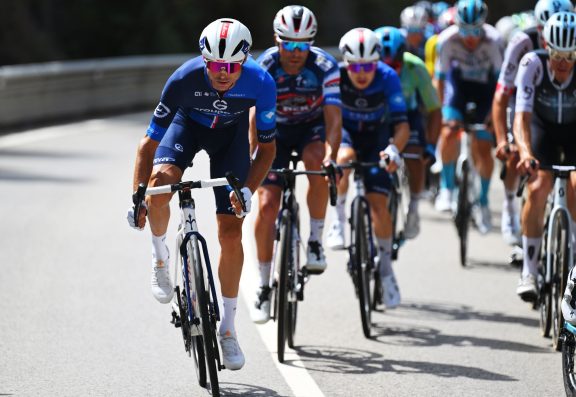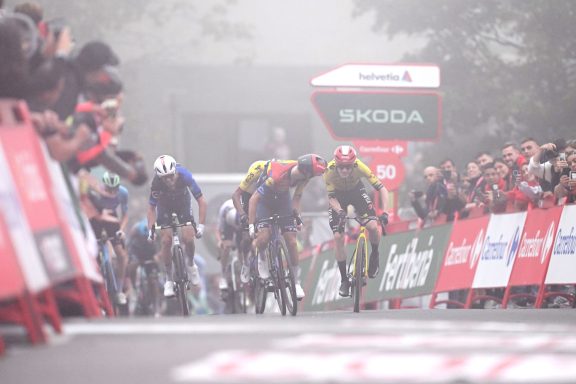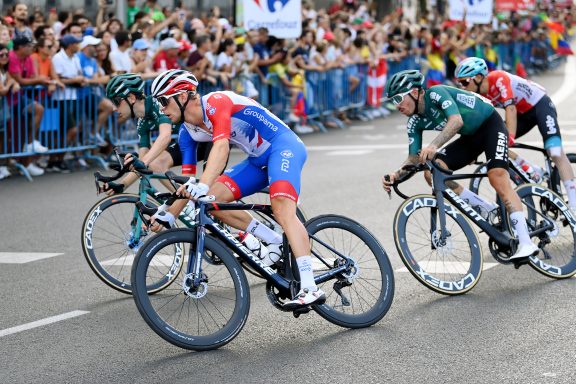The day after was not a peaceful day. In the aftermath of his first Grand Tour victory, David Gaudu – like the rest of the Vuelta bunch – had to face the legendary Alto de l’Angliru in Asturias on Sunday. The efforts he made yesterday obviously took their toll today, but the Groupama-FDJ’s leader still went dug deep on the terrible final climb’s slopes to secure a seventeenth place. Before the second rest day, he stays twelfth overall, while Anthony Roux was able to spend part of the stage in front.
The shortest on-line stage of the Vuelta was certainly not the easiest one. Some would even say that it was the exact opposite. Along the 110 kilometers that were to be covered on Sunday, no less than two first-category climbs were to be crossed. And that was before the mythical and feared finish on the Alto de l’Angliru, considered as one of the most painful climbs in pro cycling. After his great day on Saturday, David Gaudu just had to wait for the finale, but his teammates could go up the road. “We wanted to try to have someone in front in order to give a hand to David at the end of the race,” explained Philippe Mauduit. “It was off to a flying start, like every morning since the start of the Vuelta, and Anthony actually launched the right breakaway. He then managed to stay in the lead for a very long time”. “I followed the first moves and we ended up two in front with Julius van den Berg,” said the former French champion. “Then a big group came back from behind and we were about 15 riders there. We managed to get until the penultimate climb, where I was caught two kilometres from the summit. I enjoyed my day, I was going well, and I was even able to give a bit of support to David at the summit. So it was not useless. It was a good day”.
“I preferred doing my own climb”, David Gaudu
Due to the “solid tempo of Jumbo-Visma” at first, according to Philippe Mauduit, then to the acceleration of the Movistar secondly, the breakaway never gained ground and the last men standing logically got caught at the bottom of the Angliru (13.2 km at 9.3%). “In such a difficult climb, it’s every man for himself the whole way,” said Philippe. “The riders cannot stay in the wheels because the slope is so steep. In addition, not having any crowd changed the perspective a bit. I think the riders found Angliru even more difficult this year.” For David Gaudu, however, it was a first. The young Frenchman was still in a small group of favourites entering the climb, but he deliberately let himself drop back a bit before the steepest gradients. “I hadn’t really recovered from yesterday’s breakaway,” he explained. “I didn’t have great feelings today, I wasn’t at my best, and I think that’s normal. Besides, it was difficult all day. The pace was high from the start to the end. I didn’t have the legs to follow the best today so I preferred doing my own climb rather than going to the point of explosion. I knew for sure some were going to get stuck in the steep parts, and that I was going to be able to grab places as I went. In the end, I’m pretty happy with my day, especially considering what I did yesterday”.
At the top, David Gaudu eventually took 17th, 3’41 behind the winner of the day Hugh Carthy, and secured his twelfth place overall, but he also has made some great memories. “It’s still the Angliru,” he said at the finish. “There are gradients of 10% and more for six kilometers! There is also this famous slope that we see coming two kilometers from the summit. We get there with a little more speed, but we get stopped straight away. It’s straight and never-ending. Sometimes we have riders barely ten seconds ahead and we think we’re going to bridge across, but it’s so hard that we all climb at the same pace at the end. Climbing just half a kilometre/hour faster is already a lot, and it requires the maximum effort. It’s a really tough climb, and it’s not legendary for nothing”. At the end of a weekend full of experiences and emotions, the 24-year-old rider will be able to enjoy a good rest day tomorrow, like all of his teammates. The Vuelta will resume on Tuesday with a 33,7 kilometre time trial between Muros and the Mirador de Ézaro.



No comment